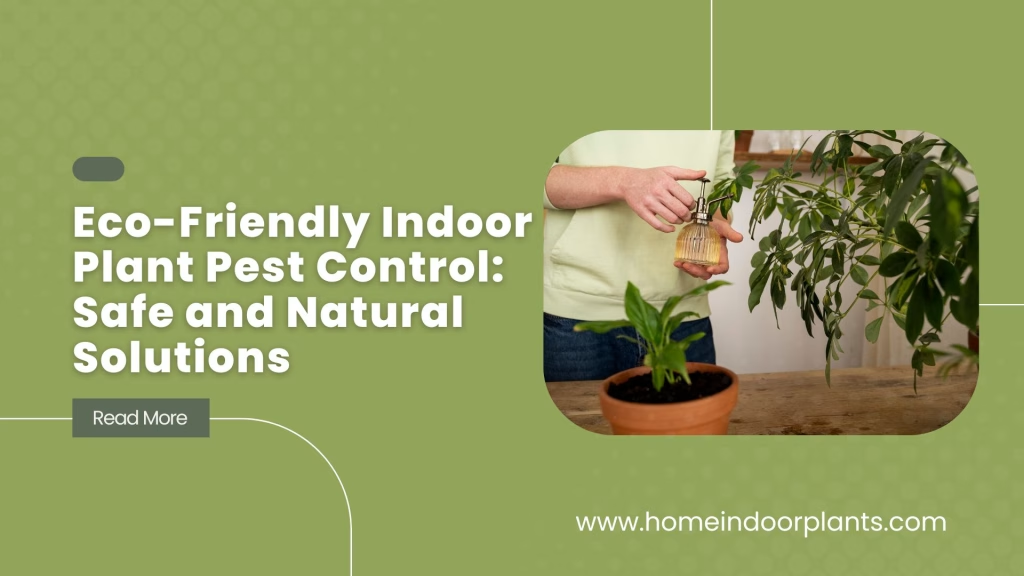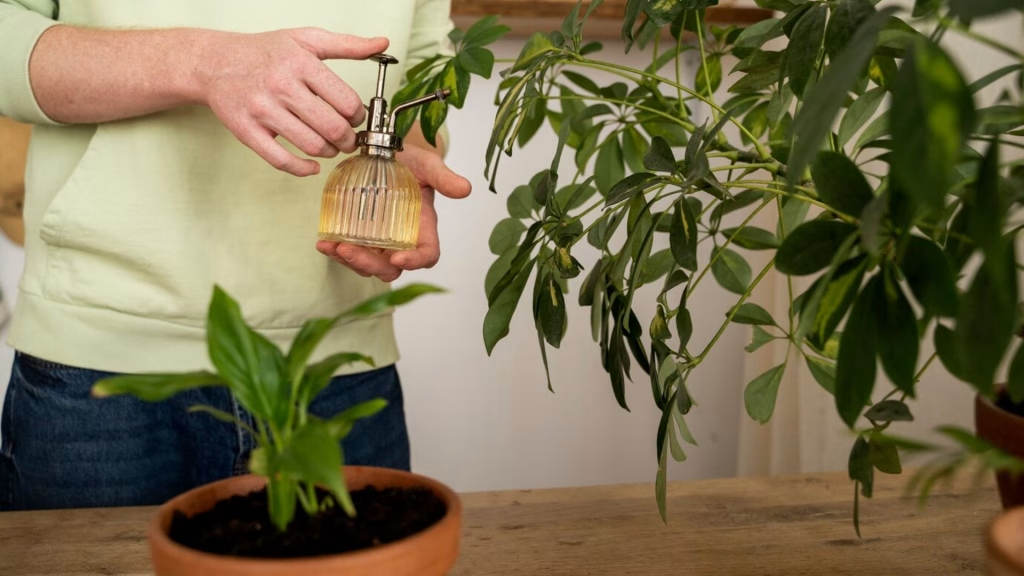Table of Contents
Eco-Friendly Indoor Plant Pest Control: Safe and Natural Solutions
Indoor plant pest control is essential for maintaining healthy and thriving houseplants. While chemical pesticides can offer quick solutions, they often come with risks to your plants, home environment, and health. Eco-friendly methods provide safe and sustainable alternatives for indoor plant pest control. In this post, we will explore various natural solutions for house plant pest control, including insect control for houseplants and effective home plant pesticides.

Key Takeaways
- Natural Predators: Beneficial insects like ladybugs and lacewings provide effective indoor plant pest control by feeding on common pests.
- Neem Oil: Neem Oil the natural pesticide for house plants disrupts the life cycle of pests and is safe for most houseplants.
- Diatomaceous Earth: A non-toxic option that dehydrates and kills insects, serving as an effective indoor house plant pesticide.
- Homemade Sprays: Garlic and chili pepper sprays act as natural deterrents, providing safe and easy home plant pesticide solutions.
- Plant Hygiene: Regular inspection and proper watering practices are essential for preventing and managing pest infestations.
Understanding Indoor Plant Pests
Before diving into eco-friendly solutions, it’s important to understand the common pests that affect indoor plants. Common indoor plant pests include aphids, spider mites, mealybugs, and fungus gnats. These pests can cause significant damage to your plants, leading to discolored leaves, stunted growth, and even plant death. Recognizing the signs of pest infestations early on is crucial for effective indoor plant pest control.
Natural Predators: Beneficial Insects
One of the most effective methods for indoor plant pest control is introducing natural predators. Beneficial insects such as ladybugs, lacewings, and predatory mites feed on common pests like aphids and spider mites. These natural predators provide an eco-friendly solution for insect control for houseplants. You can purchase beneficial insects online or from garden centers and release them onto your infested plants.
Neem Oil: A Versatile Solution
Neem oil is a popular choice for eco-friendly indoor plant pest control. Derived from the neem tree, this natural pesticide for house plants works by disrupting the life cycle of pests. To use neem oil, mix it with water and a few drops of dish soap, then spray it on your plants. This home plant pesticide is safe for most houseplants and effectively targets a wide range of pests.
Diatomaceous Earth: A Non-Toxic Option
Diatomaceous earth is a non-toxic powder that serves as an effective indoor house plant pesticide. It works by dehydrating insects such as ants, beetles, and fungus gnats. Simply sprinkle a thin layer on the soil surface or around the base of your plants. Diatomaceous earth provides a safe and natural indoor plant pest control solution.
Homemade Sprays: Garlic and Chili Pepper
Creating your sprays using garlic or chili pepper can be an effective method for indoor plant pest control. These natural remedies act as deterrents, keeping pests away from your houseplants. To make a garlic spray, blend a few garlic cloves with water, strain the mixture, and spray it onto your plants. Similarly, you can create a chili pepper spray using the same method. These homemade sprays are safe, easy to prepare, and serve as effective home plant pesticides.
Maintaining Plant Hygiene
Good plant hygiene is essential for effective indoor plant pest control. Regularly inspecting your plants for signs of pests, such as discolored leaves, holes, or sticky residue, can help catch infestations early. Remove any affected leaves and isolate infested plants to prevent the spread of pests. Maintaining a clean environment around your plants also reduces the risk of pest problems.
Proper Watering and Drainage
Ensuring proper watering and drainage can prevent many pest issues. Overwatering can lead to root rot and attract pests like fungus gnats. By allowing the soil to dry out between waterings, you create an environment less conducive to pests. This simple yet effective indoor plant pest control technique helps keep your houseplants healthy and pest-free.
Essential Oils: Natural Repellents
Certain essential oils can act as natural repellents for indoor plant pest control. Oils such as peppermint, eucalyptus, and lavender are known to deter pests like aphids and spider mites. Mix a few drops of essential oil with water and spray it onto your plants. This method provides a pleasant-smelling and eco-friendly indoor house plant pesticide.
Companion Planting
Companion planting involves growing certain plants together to enhance pest control. Some plants naturally repel pests, making them excellent companions for your houseplants. For example, planting basil near tomatoes can deter aphids and spider mites. Utilizing companion planting as part of your indoor plant pest control strategy can create a balanced and pest-resistant environment.

Soap and Water: Simple Yet Effective
A simple solution of soap and water can be highly effective for indoor plant pest control. Mix mild dish soap with water and spray it on your plants to target pests like aphids and spider mites. This method works by suffocating the pests and is safe for most houseplants. Soap and water provide an easy and affordable indoor house plant pesticide option.
Baking Soda: Fungal Control
Baking soda is an excellent natural remedy for controlling fungal infections, which can attract pests. Mix baking soda with water and spray it on your plants to prevent fungal growth. This home plant pesticide not only helps control pests but also promotes healthier plants by reducing fungal infections.
Benefits of Eco-Friendly Indoor Plant Pest Control
Adopting eco-friendly indoor plant pest control methods offers numerous benefits. These natural solutions are safe for your plants, your home environment, and your health. They reduce the risk of harmful chemical exposure and promote a balanced ecosystem. Additionally, eco-friendly methods are often cost-effective and easy to implement, making them accessible to all plant enthusiasts.
Conclusion
Indoor plant pest control is crucial for maintaining healthy and thriving houseplants. By using eco-friendly methods such as natural predators, neem oil, diatomaceous earth, homemade sprays, and essential oils, you can effectively manage pests without resorting to harmful chemicals. Maintaining good plant hygiene, proper watering, and utilizing companion planting further enhances your pest control efforts. Embrace these safe and natural solutions for indoor plant pest control to keep your indoor garden flourishing year-round.
References and Further Reading
For more information on eco-friendly indoor plant pest control, consider exploring the following resources:
- “The Organic Gardener’s Handbook of Natural Insect and Disease Control” by Barbara W. Ellis and Fern Marshall Bradley
- “Neem Oil: Benefits and Uses” by Rosemary Gladstar
- “Companion Planting for Beginners: How to Use Companion Plants for a Healthier Garden” by Brian Lowell
By adopting these eco-friendly indoor plant pest control methods, you can protect your houseplants and create a healthier living environment. Natural solutions like neem oil, diatomaceous earth, and beneficial insects provide effective insect control for houseplants while maintaining a healthy home. Embrace these safe and natural solutions to keep your indoor garden thriving year-round.
FAQs
1. What are the most common pests affecting indoor plants? Common pests include aphids, spider mites, mealybugs, and fungus gnats. Recognizing these pests early is crucial for effective indoor plant pest control.
2. How can I use neem oil for indoor plant pest control? Mix neem oil with water and a few drops of dish soap. Spray this mixture on your plants to disrupt pest life cycles. It’s a versatile and safe pesticide for house plants.
3. What is diatomaceous earth, and how does it work? Diatomaceous earth is a non-toxic powder that dehydrates insects. Sprinkling it on the soil surface or around plant bases provides an effective indoor house plant pesticide.
4. Are there natural repellents for indoor plant pest control? Yes, essential oils like peppermint, eucalyptus, and lavender can deter pests. Mix a few drops with water and spray it onto your plants for a natural repellent.
5. How does proper watering help with pest control? Overwatering can lead to root rot and attract pests like fungus gnats. Allowing the soil to dry out between waterings creates an environment less conducive to pests, aiding in indoor plant pest control.